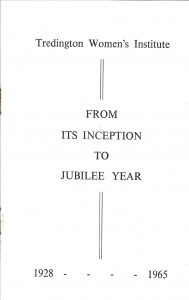Our History
Tredington Women’s Institute. From its inception to the NFWI Jubilee Year: 1928-1965.
Written in 1965 by ALICE WALTON, which was the 50th anniversary of the founding of the Women’s Institute.
Before beginning to tell of the doings of our Institute, we must try and picture our village at the time of its inception.
It was purely agricultural and the farming was being carried on more or less in the quiet slow pace of the big shire horse. There was none of the noise and rush of the combustion engine. There were a few infrequent buses which had superseded the village carrier, or the horse and cart of the owners of such luxuries. There was, of course, no electric light, little indoor water supply or sanitation, the earth closet still providing valuable manure for the allotment and garden, no public telephones, and few private ones. There was little community life except that provided by the Pub, then practically a “closed shop” for men, or the Mothers’ Union for women. Musical tradition still lingered as a heritage from our Welsh rectors of the past but taking it as a whole there was little for the women beyond the daily round and common task of their homes.
The first World War was over, leaving us all poor and drained of materials of all kinds, and the Movement, which started in Wales, was brought into being by these conditions. Its aims and constitutions were to produce and preserve the food of farm and garden, to foster home crafts and aid rural education, give entertainment and community social life. It is a democratic constitution with an elected president and committee to carry out the work and wishes of the members, and the only rules that no party politics or sectarian religion be discussed, as these two most controversial subjects might cause members embarrassment.
There were to be monthly meetings with duly kept records, and speakers and demonstrators could be contacted through the panel of speakers provided by the County H.Q. of the Federation. Having served on this panel for about a year, I saw what a difference to village life it was making, and when County Office suggested a branch being formed in our village I was delighted. But our birth was not without its pains. The chief stumbling block was the difficulty of finding a meeting place. The only one available for such things was the Church School, and the rector at that time disapproved of the movement, and so made the charge prohibitive as we had no funds. However, nothing daunted, we gratefully accepted the kind offer of Mrs Holtom to use the disused bakehouse of the Old Mill.
There was no means of heating nor furniture or equipment for the cup of tea, but one provided an oil stove, another an old carpet to cover the uneven stone floor. Odd chairs appeared and sacks of meal or potatoes were utilised for seats, and what was there against the old village custom of taking your own cup and saucer? So, after a meeting of the whole village, which unanimously decided to form a branch, on February 13th, 1928, a representative from H.Q. Federation of Women’s Institutes presided over the first meeting and I was elected the first President, with Mrs. Hewins and Mrs. Wilkes Snr., as Vice-Presidents, Mrs. Withey as Secretary, and Committee members, Mesdames Heaton, Berry, Holtom, Hewins, Humphries and Miss Hodges. Foundation members were Mrs. Summerton, B. King, G. King, Lunnon, W. Lunnon, E. Lunnon, Handcock, Rawlins, C. Rawlins, R. Rawlins, I. King, Bishop and Hollis, a total in all of twenty-three. The only member who had previous experience was Mrs. Withey, who gave invaluable service as secretary for three years, and was succeeded by Mrs. J. Eden, who held the office for twenty-one years.
Beyond the usual activities inaugurated by the monthly meeting, our chief preoccupation was raising money to build our own Hall. It was gathered by incredibly small sums by the standards of today. We traded with a shilling, we went picking blackberries with the added attraction of a picnic tea while doing so. We grew potatoes, we had Whist Drives and Fetes, with every known small gambling tick. But the biggest and most important event was a pageant of our own history.
The idea was started by a talk on local history by Miss Mills of Pillerton, who was secretary to the Warwickshire Local History Society, and she gave us most wonderful help. We enacted four episodes:
- The burial of a Saxon king reputed to be buried here.
- A Court Leet in the Middle Ages (chiefly chosen for picturesque head-dress)
- The arrest of Fox, the founder of the Quakers and denounced by our Rector at that time.
- Club day in Victorian times, with authentic dresses.
